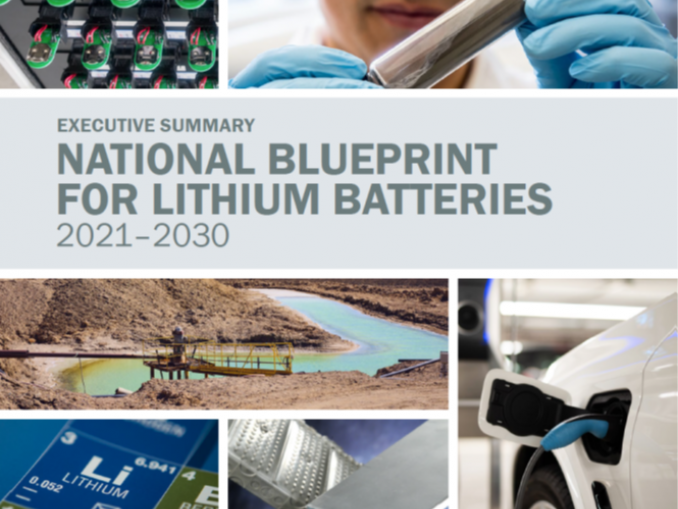National Blueprint for Lithium Batteries 2021-2030

The National Blueprint for Lithium Batteries 2021–2030 was published by the Federal Consortium for Advanced Batteries (FCAB) (previous post) to direct investments in the urgent creation of a domestic lithium-battery manufacturing value chain.
The Biden Administration has outlined a bold plan to confront the climate problem and create a clean and fair energy economy that delivers carbon-pollution-free power by 2035 and puts the US on a path to reach economy-wide net-zero emissions by no later than 2050.
Our daily activities, from consumer gadgets to national security, are powered by lithium-based batteries. They are essential to advancing the clean energy economy since they allow for the electrification of the transportation sector and offer stationary grid storage. The United States has a strong research community, a strong infrastructure for innovation aimed at advancing battery technology, and a growing lithium-based battery manufacturing sector.

Lithium-ion Battery – Eliminating the Problems of Fuels for Vehicles
Lithium-based batteries need to be manufactured domestically, which calls for a national commitment to both finding solutions to cutting-edge scientific problems for new materials and building a manufacturing base that can meet the needs of the expanding electric vehicle (EV) and stationary grid storage markets.
The Federal Consortium for Advanced Batteries developed this National Blueprint for Lithium Batteries 2021-2030 to help direct investments in the development of a domestic lithium-battery manufacturing value chain that generates fair clean-energy manufacturing jobs in America while assisting in mitigating the effects of climate change.
The strategy outlines five important objectives to direct cooperation between government agencies:
- Discover substitutes for essential minerals for use in defense and commercial applications. Ensure secure access to raw and refined resources. The objective is to lessen the reliance of US lithium-battery production on rare elements, particularly cobalt and nickel, to create a stronger, more reliable supply chain. As important as finally replacing these materials in the lithium-battery supply chain is finding trustworthy domestic and international sources for essential minerals through continuous US Government programs and working with allies.
- Encourage the development of a US materials-processing infrastructure that can meet the need for domestic battery production. The majority of lithium-battery raw materials are now processed outside of the United States in foreign markets.
- Encourage the manufacture of electrodes, cells, and packs in the US. The local expansion and onshoring of cell and pack manufacturing will necessitate continual incentives and support for the uptake of EVs notwithstanding substantial advancements in battery energy storage technologies. The US should create a legal framework that favors domestic production of lithium-ion battery electrodes, cells, and packs and promotes demand growth.
- Enable large-scale US essential materials recycling and end-of-life reuse, as well as a complete competitive value chain in the US Lithium-ion cell recycling, not only reduces material scarcity and improves environmental sustainability, but it also enables a domestic circular materials supply chain that is more dependable and secure. Recyclers now incur a net end-of-life cost when recycling EV batteries, with transportation fees making up more than half of these costs. To gather, classify, transport, and process recycled lithium-ion battery materials successfully and at lower costs, new techniques must be created.
- In addition to recycling, a robust market for the reuse of battery cells from retired EVs for further purposes, like grid storage, should be developed. Battery cell packs must be properly sorted, tested, and balanced before being used a second time.
- Maintain and strengthen the US’s leadership position in battery technology by firmly promoting scientific R&D, STEM education, and workforce development. Maintaining US leadership depends on the pipeline of R&D, which includes new electrode and electrolyte materials for next-generation lithium-ion batteries, advancements in solid-state batteries, and unique material, electrode, and cell manufacturing technologies. Strong intellectual property (IP) protection will underpin the R&D, and public-private R&D partnerships similar to those that have been developed in the semiconductor industry will speed the transfer of breakthroughs from the lab to the market.
- The FCAB promotes coordination and cooperation among US Government entities working on advanced batteries and aims to create a stable domestic ecosystem. The consortium, which is comprised of numerous government agencies, is coordinated by the Departments of Energy, Defense, Commerce, and State.
